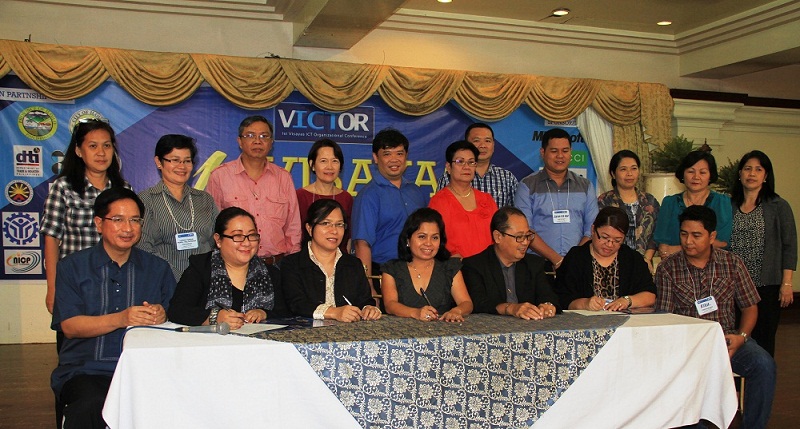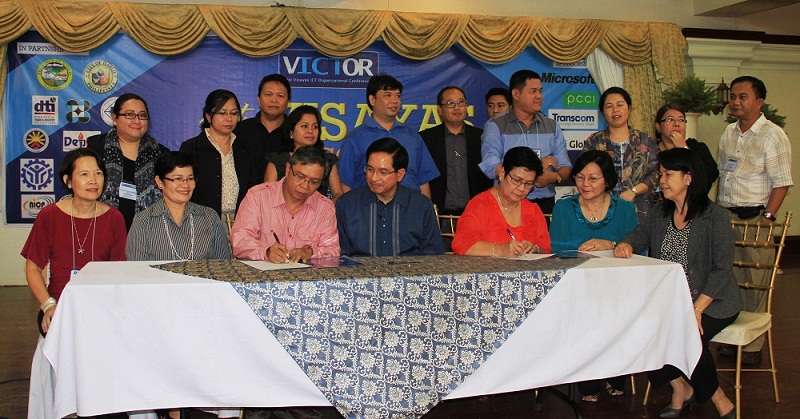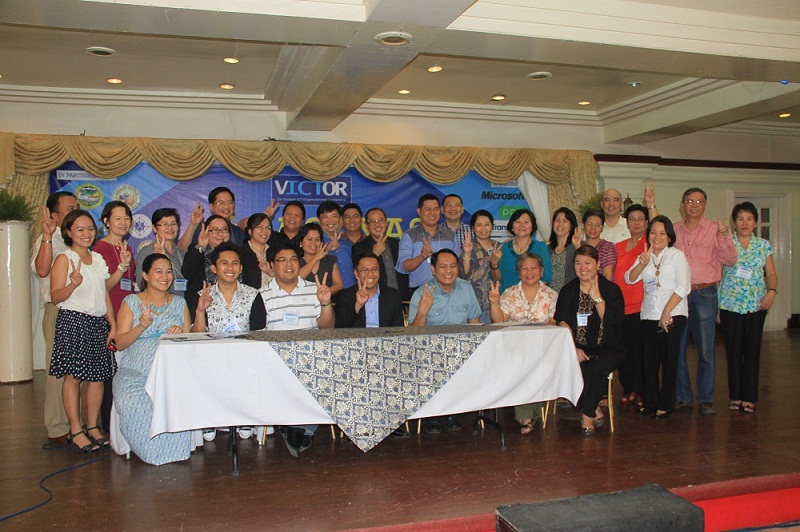
Lead convenor Jocelle Batapa-Sigue, chair of the National ICT Confederation of the Philippines (NICP) said the unanimous sentiment was to submit the manifesto to their respective regional development councils for Regions VI (Western Visayas), VII (Central Visayas) and VIII (Eastern Visayas) urging them to support the same.
VICTOR was jointly convened by the ICT councils of Visayas, namely, the Bacolod-Negros Occidental Federation for Information and Communications Technology (BNEFIT), Iloilo Federation for Information Technology (IFIT), Leah Tirol-Magno of Bohol ICT Council, Cebu Educational Development Foundation for IT (CEDFIT), ICT Association of Dumaguete and Negros Oriental, Iloilo Federation for IT (IFIT), Northern Samar ICT Council, Eastern Visayas Federation for IT (EVFIT) and Kalibo-Aklan IT Enablers (KAITE). VICTOR was hosted by IFIT chaired by Jessraf Palmares with Executive Director Joeven Tansi.
In his welcome message, RDC VI Chair and Capiz Governor Victor Tanco said bringing ICT to the LGUS should be among the strategic directions of our leaders. He believes that the proper use of ICT promises not only a better social life and can also transform them into better managed communities where people can have peaceful and productive lives.
The ICT councils which led in the signing have been working in collaboration with each other since 2008 under the banner of the National ICT Confederation of the Philippines (NICP), a network of ICT councils in Luzon, Visayas and Mindanao which has the goal of developing a “Smarter Countryside” to ensure that the growth of ICT and ICT-enabled industries spread to other cities and provinces outside of Metro Manila.
The stakeholders agree that said collaboration and good working relationship is anchored in the participation of the national government agencies, local government, academe and human resource or talent development sector as well as the private or business sector, and that such collaboration proved to be beneficial in raising the potential of the Visayas for more jobs, revenues, investments and opportunities drive by ICT and ICT-enabled sector.

VICTOR was prompted by the desire of the ICT councils along with their respective stakeholders in their cities, provinces and regions to solidify the collaborative efforts leading to the harmonization of initiatives of the whole Visayas, the harnessing of key players to ensure that programs and projects are well coordinated hence effectively implemented, and the development of a unified collective stand on various issues affecting the ICT industry in the Visayas.
As part of the manifesto, the stakeholders committed to explore solutions that will reduce electicity rates and ensure efficient infrastructure to enhance and sustain the positive business ecosystem for all the Visayas regions. They agreed to request the Department of Energy through the Honorable Secretary Carlos Jericho Petilla to seriously look into the matter of the increasing electricity rates in the Visayas and explore solutions to reduce said rates in order to sustain and support the competitiveness of Visayas in ICT or ICT-enabled industries.
With respect to talent development, the signatories committed to help develop and undertake talent development programs and other related programs to improve the quality and quantity of human resource of the Visayas regions. They collectively agreed to request the Technical Education and Skills Development Authority (TESDA) to increase the allocation of bridging courses for call center training, software development, creative outsourcing, financial and accounting, train-the-teacher (T3), and other trainings related to ICT and ICT-enabled industries, and for TESDA to develop programs that is responsive to the needs of countryside so that public funds intended for skills development are equitably distributed.
VICTOR also sounded a request to higher education institutions, technical-vocational institutions, and local government units to develop, offer, equip and deliver the desired results training programs that specifically address the talent development to work with industry associations concerns of the Visayas. They will also request the Commission on Higher Education (CHED) to fast track the implementation of Service Management Program (SMP) tracks in the Visayas.
The consensus was also to request the Department of Education’s direct and active involvement and collaboration in the ICT programs of the various ICT Councils in the Visayas, and to encourage and forge strong collaboration and conduct dialogue with professional associations such as for nurses, accountants, engineers, and architects to mainstream ICT skills in regular courses.
A follow-up to VICTOR is a joint dialogue among the regional stakeholders with DepEd, TESDA, CHED and other human resource (HR) and professional organizations in the Visayas.

In the aspect of marketing and promotions, VICTOR participants committed to work together to promote Visayas as a global ICT destination. They will formally request the Information and Communications Technology Office (ICTO) of the Department of Science and Technology (DOST) and the Department of Trade and Industry (DTI) to develop marketing and promotion programs that will project a more unified and stronger Visayas as a global ICT cluster.
VICTOR participants also committed to help improve our business environment and work hand in hand with their respective local governments. They will request the Department of Interior and Local Government (DILG) to assist the ICT councils in undertaking regular consultations and dialogues with local government officials to ensure the effectiveness of ICT programs developed under this resolution. They will also encourage LGUs in the Visayas to design incentives and implement policies and programs to attract ICT and other investment, and to develop investment and incentives programs for local MSME, ITprenuers, and start-up companies.
The local stakeholders will also push for the DOST to support the creation of more Technology Business Incubation (TBIs) for Visayas.
Collectively, the ICT councils, agreed to cooperate with local institutions to enhance and realize the common goals and aspirations to generate jobs and investments for their respective regions. As ICT Councils, they committed to shall undertake to become members of their local investment and business committees for investments and to apply for accreditation to their local development councils.
All the participants of VICTOR likewise commited to closely collaborate with the Regional Development Councils of Region 6, 7, and 8 and report the results of the 1st Visayas ICT Organization Conference to Regional Development (RDC) regular meeting.
As local and regional stakeholders, they also commited to support the National Industry Cluster Capacity Enhancement Program (NICCEP) for the ICT sector developed by all the ICT Councils in the Visayas in collaboration with DTI and Japan International Cooperation Agency (JICA).
